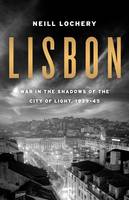 The great Italian poet Dante Alighieri once said, "the hottest places in hell are reserved for those who, in times of great moral crisis, maintain their neutrality". I generally agree with that sentiment when I look back on history and the lamentable omissions of leaders.
The great Italian poet Dante Alighieri once said, "the hottest places in hell are reserved for those who, in times of great moral crisis, maintain their neutrality". I generally agree with that sentiment when I look back on history and the lamentable omissions of leaders.
However, I'm reminded from time to time that geopolitical life isn't always as simple as it seems ... especially after reading baffling books like Neill Lochery's Lisbon: War in the Shadows of the city of Light, 1939-45.
Lisbon covers the history of Portugal during WW2 under the dictator General Salazar, as he navigates the seas of non-alignment - among other seemingly unethical things. Make no mistake, Salazar was a shrewd economist and politician, but opposed liberalism, democracy, socialism and anarchism (there being a strong anarchist movement in Europe at the time). Basically it was a fascist, authoritarian regime which persecuted lots of people.
But, despite the fascism that Lochery describes, the Salazar regime achieved the seemingly impossible during WW2 - Portugal being one of the few windows of escape from German occupied Europe for tens of thousands of persecuted Jews. Who then made their way to America, South America, England and Palestine.
However, not only was Portugal an avenue for escape for Europe's Jews, its neutrality meant it was a swirling frenzy of desperate humans, all trying to get theirs in an environment wracked with widespread espionage and a bountiful black market (other war refugees, human trafficking, bribery, commercial dealings). Strangely, despite the authoritarian Portuguese regime with its secret police, laissez-faire Lisbon was a city where foreign operatives could to what they wanted, as long as Portugal's internal affairs where left alone.
Therefore, Lisbon became a hive of WW2 undercover operations as German, English and American agents attempted to buy people, information and documentation in order to sabotage the other teams interests. One noteworthy individual in the midst of it all was Ian Fleming, who conceived his James Bond stories as a result of his experiences as an agent frequenting bars and gambling in Lisbon (think Casino Royale).
So, with all this carry-on comes intimate stories of individual brilliance and blundering as various agents, politicians, public servants and officials cleverly secured passage for escaping Jews and other scared peoples. The story of actor Leslie Howard's (Gone With The Wind) death is relayed to us, as he and several other Jewish and English persons of interest are shot down in a plane leaving Lisbon. German counter-intelligence hoping Churchill was in there too. All rather thrilling!
Salazar's economic dealings were a tightrope walk. He needed to keep his economy afloat, all the while keeping the Allies and Germans happy with critical exports for their own war efforts - export too much and one side gets angry at you, export too little and Hitler might get suspicious and invade you like he did the rest of mainland Europe. The pressure really must have been unbearable at times for Salazar, who was surrounded in Europe by Fascist Spain and Italy in the South, and Fascist Germany controlling much of Europe - any solid evidence of collaborating with the English and Portugal would have been pincered.
The author does well to convey the tension and apprehension of the people on the streets and in political office - as if time was running out to move the tide of refugees and information on to safer shores, before Hitler rumbles into town. In this respect this work reminds me of the film Casablanca. If you like that, then you will like this.
It leaves me a bit perplexed in terms of my own ethical principles, because Salazar was in many ways a tyrant. But that's the thing I like about this book - it gives you insights into the decision making processes of those in leadership, without whom, many more lives would have been ruined.
Despite developing an appreciation for Salazar's war time leadership, he was still a fascist. Give me liberal democracy any day.
Oh, and its a beautiful book cover too.




Add a comment to: Lisbon: War in the Shadows of the City of Light, 1939-45